|
|
|
Sort Order |
|
|
|
Items / Page
|
|
|
|
|
|
|
| Srl | Item |
| 1 |
ID:
099899


|
|
|
|
|
| Publication |
2010.
|
| Summary/Abstract |
America won an asymmetric war in Iraq and lost an asymmetric peace. Translating material power advantage into favourable political outcomes has been a challenge for great powers down the ages-what makes this bridge even more difficult to cross today is the raised expectations on the part of liberal publics about the moral purpose of US-led interventions. In this sense, Iraq is part of the explanation for why influential liberals believe there is a 'crisis' in America's world leadership. 'America after Iraq' subjects this claim to analytical scrutiny-in particular it addresses whether Iraq was simply a chapter in a longer book detailing American power and purpose in the post-9/11 world? In answering this question the article is drawn to consider conceptual debates about a shift in the international system from anarchy to hierarchy with the US as the hegemonic power. While it rejects strong versions of the hierarchy thesis that imply the Washington is the new Rome, it is nevertheless drawn to an understanding of a hierarchical form of ordering where the US oscillates between a hegemonic role and an imperial outlaw. Seen through this lens, the Iraq War was an intervention that happened because it could, and not because it was just or necessary. Public opinion and the weakness of domestic institutions are also critical factors in explaining how it was possible for a previously status-quo oriented hegemonic power to act recklessly and put the rules and institutions of international society under strain.
|
|
|
|
|
|
|
|
|
|
|
|
|
|
|
|
| 2 |
ID:
099562
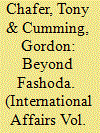

|
|
|
|
|
| Publication |
2010.
|
| Summary/Abstract |
Traditionally divided on security matters, France and Britain broke new ground when they signed the 1998 Saint-Malo agreement, promising to collaborate on defence and security, and pledging to cooperate bilaterally and in a 'bi-multi' fashion on Africa. This Anglo-French collaboration is the focus of this article, which begins by setting out the lack of UK-French security cooperation in Africa from the colonial to the early post-Cold War era. It then shows how there has been a degree of institutionalization of Anglo-French relations, alongside greater cooperation in terms of ESDP missions and the training of African peacekeepers. Next, this study explains the recent evolution of UK-French security relations in terms of neo-classical realist theory. Finally, it assesses the likelihood of closer Anglo-French security collaboration in the future.
|
|
|
|
|
|
|
|
|
|
|
|
|
|
|
|
| 3 |
ID:
099563
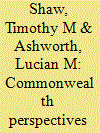

|
|
|
|
|
| Publication |
2010.
|
| Summary/Abstract |
The parallel development of the inter- and non-governmental Commonwealths on the one hand and the field of International Relations and its oldest journal, The Round Table, on the other, should not go unnoticed at the start of the second decade of the century. This article suggests that the Commonwealth nexus has always constituted a distinctive perspective and debate in both the metropole and the rest of the Commonwealth's expanding official and unofficial networks. The Commonwealth 'School' both reinforces and contrasts with other non-US and non-hegemonic approaches presently animating the field.
|
|
|
|
|
|
|
|
|
|
|
|
|
|
|
|
| 4 |
ID:
099558


|
|
|
|
|
| Publication |
2010.
|
| Summary/Abstract |
Germany has traditionally played a key role in promoting European Union solutions to domestic policy problems. In doing so it gained a reputation as a 'tamed power' (Katzenstein). This article reviews Germany's diplomacy two decades after unification. It explores the 'tamed power' hypothesis with reference to three policy areas: constitutional reform in the EU; Justice and Home Affairs policy; and an issue that has made German European policy very salient of late, the management of the Eurozone. The article argues that Germany has become a much less inclusive actor in European policy, pursuing policy solutions through 'pioneer groups' where these offer greater promise than the EU itself and becoming increasingly attentive to domestic political constraints. The article argues that Germany has become a normalized power, with significant implications for the EU.
|
|
|
|
|
|
|
|
|
|
|
|
|
|
|
|
| 5 |
ID:
099900
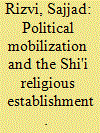

|
|
|
|
|
| Publication |
2010.
|
| Summary/Abstract |
Since the fall of the Ba'athist regime in 2003, the Shi'i religious establishment in Iraq has come to the fore as a signifcant political force, intervening, guiding, supporting and opposing various types of developments. Its prominence has been directly related to the realization that the Shi'a constitute an absolute majority in Iraq and hence would have the primary influence in a democratic state. Alongside the recognition of its importance, some analysts tend to assume that the Shi'a are more inclined than others in Iraq to follow their religious and cultural leadership. This article attempts to clarify a number of issues pertaining to the actual attitudes and relationships between the marja'iyya and politics in Iraq. First, it examines three important approaches to an activist understanding of the role of the marja'iyya in politics and comments on the actual political movements that arise from them. Second, the article analyzes the role of the paramount fgure in the marja'iyya in Najaf, Ayatollah Ali Sistani and his attitudes towards politics and some of his active interventions in Iraqi politics. Finally, it comments on outstanding problems and failures within the leadership of Shi'i politics and the limitations of the marja'iyya in promoting democratic and civic politics. Any political actors in contemporary Iraq must take cognizance of the role of the marja'iyya but also account for the deficits that need to be overcome to propel Iraq beyond a compromise of ethnic and confessional affliations.
|
|
|
|
|
|
|
|
|
|
|
|
|
|
|
|
| 6 |
ID:
099560
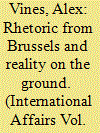

|
|
|
|
|
| Publication |
2010.
|
| Summary/Abstract |
This article overviews the development of African Peace and Security Architecture (APSA) to date and examines EU involvement in this. The European Union is the major financial partner in both military and non-military assistance to the African Union (AU). Europe has shifted from being a major UN troop contributor towards the funding of African-led peace operations, as well as the emergence of time-limited, high-impact, missions. With the exception of Somalia, these ESDP operations have provided little direct security benefit to Europe and their success has been limited. They have provided experimentation opportunities of ESDP capabilities in the Democratic Republic of Congo, Chad and Guinea Bissau. Events in the eastern Congo in late 2008 demonstrate that the EU needs to consider carefully when it intervenes militarily in Africa: non-intervention and coordinated bilateral diplomatic efforts by EU member states can be more effective.
|
|
|
|
|
|
|
|
|
|
|
|
|
|
|
|
| 7 |
ID:
099561
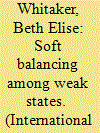

|
|
|
|
|
| Publication |
2010.
|
| Summary/Abstract |
Recent literature on the use of soft balancing to counter the hegemony of the United States has focused primarily on middle powers in Europe and rising powers such as China. But what about weak states? Do they simply go along with the hegemon, or do they challenge its policies despite the odds? And to what extent does the soft balancing argument explain their behaviour? In recent years, several historically friendly African countries have used non-military means to undermine the unilateral policies of the United States. Leaders in South Africa, Kenya, Nigeria, Tanzania, Mali, Namibia and Niger especially have resisted US demands in areas such as the 'war on terror', the International Criminal Court and the US Africa Command. This article seeks to explain the strategies of opposition that some African countries have pursued. It finds that the behaviour is driven both by regional power concerns and by domestic political considerations. Interestingly, public opinion in these relatively democratic countries is motivated by disagreements with US policy and by resentment of the predominance of American power. Thus, the evidence both confirms and challenges the notion of soft balancing. On one hand, the behaviour of African states is driven at least in part by the global balance of power-directly, as leaders respond to power concerns within the continent, and indirectly, as citizens pressure leaders to resist the hegemon. On the other hand, these findings challenge the underlying premise that state behaviour is determined solely by structural concerns. Instead, the oppositional behaviour of African states has both systemic and domestic explanations.
|
|
|
|
|
|
|
|
|
|
|
|
|
|
|
|
| 8 |
ID:
099559


|
|
|
|
|
| Publication |
2010.
|
| Summary/Abstract |
The plan for the southern energy corridor delivering a new secure supply of natural gas to the European Union is shaped by projects for two pipelines-Nabucco and the South Stream. Economic rationales for both projects are far from solid as the prospects for returns on massive investments are doubtful due to uncertainty about demand. Much political effort has nevertheless been expended on advancing these competing 'mega-projects', which have acquired symbolic status in different approaches to securitization of energy matters. The continuing recession has not added much weight to common economic sense, which dictates that the most efficient way to bring Russian and Caspian gas to Europe is modernization and joint management of Ukrainian gas infrastructure. Parallel construction of both pipelines remains the most probable outcome of their 'race', while simultaneous cancellation could have saved resources and political faces.
|
|
|
|
|
|
|
|
|
|
|
|
|
|
|
|
| 9 |
ID:
099564


|
|
|
|
|
| Publication |
2010.
|
| Summary/Abstract |
This article presents two approaches that have dominated International Relations in their approach to the international politics of health. The statist approach, which is primarily security-focused, seeks to link health initiatives to a foreign or defence policy remit. The globalist approach, in contrast, seeks to advance health not because of its intrinsic security value but because it advances the well-being and rights of individuals. This article charts the evolution of these approaches and demonstrates why both have the potential to shape our understanding of the evolving global health agenda. It examines how the statist and globalist perspectives have helped shape contemporary initiatives in global health governance and suggests that there is evidence of an emerging convergence between the two perspectives. This convergence is particularly clear in the articulation of a number of UN initiatives in this area-especially the One World, One Health Strategic Framework and the Oslo Ministerial Declaration (2007) which inspired the first UN General Assembly resolution on global health and foreign policy in 2009 and the UN Secretary-General's note 'Global health and foreign policy: strategic opportunities and challenges'. What remains to be seen is whether this convergence will deliver on securing states' interest long enough to promote the interests of the individuals who require global efforts to deliver local health improvements.
|
|
|
|
|
|
|
|
|
|
|
|
|
|
|
|
|
|
|
|
|